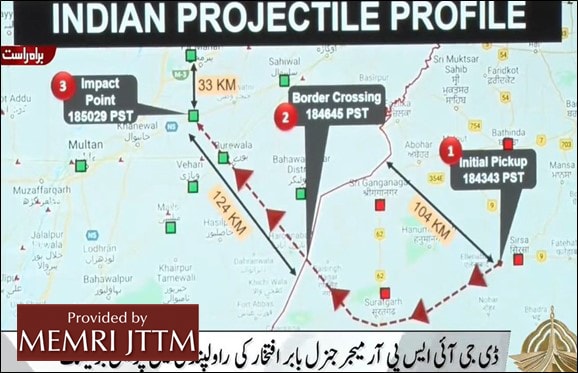In the second week of March 2022, while global attention was focused on the Russian invasion of Ukraine, Pakistan and India missed nuclear annihilation by a fluke.
"On March 9, at 6:43pm, a high-speed flying object was picked up inside the Indian territory by Air Defence Operations Centre of the Pakistan Air Force (PAF). From its initial course, the object suddenly manoeuvred toward Pakistani territory and violated Pakistan's air space, ultimately falling near [Pakistani town of] Mian Channu at 6:50pm," Maj.-Gen. Babar Iftikhar, the director general of the Pakistani military's Inter-Services Public Relations (ISPR) department told the press the next day.[1]
"It was a supersonic flying object, most probably a missile, but it was certainly unarmed," he said, adding: "It is important to highlight that the flight path of this object endangered many international and domestic passenger flights – both in Indian and Pakistani air space – as well as human life and property on the ground. "Whatever caused this incident to happen, it is for the Indians to explain."[2]

India maintained silence on the issue for two days. On March 11, the Indian government issued a statement, saying: "On 9 March 2022, in the course of a routine maintenance, a technical malfunction led to the accidental firing of a missile. The Government of India has taken a serious view and ordered a high-level Court of Enquiry. It is learnt that the missile landed in an area of Pakistan. While the incident is deeply regrettable, it is also a matter of relief that there has been no loss of life due to the accident."[3]
India has an estimated 150 nuclear warheads, while Pakistan is thought to have 160 nuclear warheads. The risk was that Pakistan could have fired a nuclear missile into India in panic. Pakistani Prime Minister Imran Khan said: "We could have responded after an Indian missile fell in Mian Channu [in Punjab province] but we observed restraint."[4]
Moeed W. Yusuf, the National Security Adviser of Pakistan, tweeted: "It has taken more than 2 days for India to accept that this was their missile launched ostensibly due to a technical malfunction during maintenance. This raises serious questions about India's ability to handle such sensitive technology..."[5] Pakistan demanded a joint Pakistan-India investigation into the incident. "This is a reasonable demand," wrote Husain Haqqani, the former Pakistani ambassador to the U.S.[6]
"A Statement From India Admits That It Was An Accident But Does Not Go Far Enough To Explain How Such A Dangerous 'Mishap' Could Have Happened"
Following are excerpts from an editorial in Pakistani daily Dawn, explaining the risks involved between the two nuclear rivals:[7]
"It was an incident that could have had catastrophic results. Luckily, the crashing of an Indian missile in Mian Channu on Wednesday [March 9] was met by a measured response by the Pakistan armed forces that refrained from military retaliation. A statement from India admits that it was an accident but does not go far enough to explain how such a dangerous 'mishap' could have happened. The statement also does not render a clear and unambiguous apology to Pakistan.
"The response from Pakistan has been categorical and demands answers that are necessary to determining how exactly this provocation happened and what India intends to do to ensure it does not recur. Even so, Pakistan should review its own defense system to find any loopholes that may need to be plugged in case there is another incident of the kind.
"There is, however, the matter of framing this incident within the larger context of tense relations between two nuclear powers. It is a miracle that the incident has not extracted a bigger price. Whizzing through the Pakistani airspace at the height that it did, the missile could have hit a commercial aircraft leading to unimaginable consequences. It could have crashed into a populated area and caused damage to life and property. It could have also triggered a military response thereby resulting in a conflagration through misunderstanding and miscommunication.
"We were lucky. But this luck must never be tested again."
"The Incident Is A Wake-up Call For Both India And Pakistan With Regard To The Safety Of A Nuclear South Asia"
"The incident has exposed the grave weakness in India's technology and its safety systems. This should not be only Pakistan's concern; the international community must also demand greater transparency from India. For a nuclear-armed country to be so shoddy with its technology and so weak with its command and control systems is cause for serious alarm across the world. In particular, the safety mechanisms of strategic weapons and the security protocols in place to ensure no accident takes place are well established among all nuclear states.
"This missile incident unfortunately proves that India's systems are either weak, or compromised, or both. The relevant international agencies should demand to inspect India's systems and verify that the weakness and loopholes have been addressed to the satisfaction of all. Pakistan has the right to have access to this information because it is directly affected by any incompetence on India's part in handling its strategic weapons.
"The incident is a wake-up call for both India and Pakistan with regard to the safety of a nuclear South Asia. It must be treated with the seriousness that it merits and not minimized as a minor accident whose probe remains hidden from public view. It is also in this context that, as nuclear rivals, both Pakistan and India should ensure that communication channels are always open to avert the risk of such incidents in the future."




